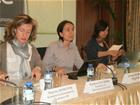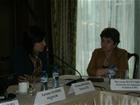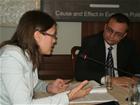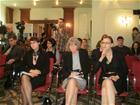Want more debates on important European issues? Let's do them!
Ralitsa Kovacheva, July 3, 2011
 There is a severe need for debates in Bulgaria on the important European issues and, most of all, on the Bulgarian positions. This thesis united all the participants, no matter of their political affiliations, profession or post, in the discussion about EU's economic governance and the Bulgarian challenges, organised by euinside. This is a kind of a paradox, actually, because if there is such a severe need, there is no reason why this conversation not to be taking place. On the other hand, though, it is easy to explain, given the complexity of the issues and the need of deep knowledge and understanding.
There is a severe need for debates in Bulgaria on the important European issues and, most of all, on the Bulgarian positions. This thesis united all the participants, no matter of their political affiliations, profession or post, in the discussion about EU's economic governance and the Bulgarian challenges, organised by euinside. This is a kind of a paradox, actually, because if there is such a severe need, there is no reason why this conversation not to be taking place. On the other hand, though, it is easy to explain, given the complexity of the issues and the need of deep knowledge and understanding.
The head of European Commission's representation in Bulgaria, Zinaida Zlatanova, recalled the entire path the Commission walked to the six pack of proposals for economic governance, and Ms Iliana Ivanova, a Member of the European Parliament from the European People's Party explained the amendments to the legislative pack, made by Parliament, of which euinside wrote extensively.
The dispute between Parliament and the Council, however, is still going on and  with the latest attempt, again, a compromise was not reached, Ms Ivanova said. According to her, there is a small but real probability Parliament not to manage to approve the package in July, as it wished. The biggest stumble block, as we have many times explained, is the reverse majority voting - the principle, according to which the Commission's decisions enter into force automatically unless rejected by the Council by a two thirds majority. "Some member states do not want such a text because thus they would have to vote against themselves", Iliana Ivanova explained. She stressed that Bulgaria and the new member states get a more alleviated treatment in reporting macro economic imbalances, so that the effect of convergence can be taken into account.
with the latest attempt, again, a compromise was not reached, Ms Ivanova said. According to her, there is a small but real probability Parliament not to manage to approve the package in July, as it wished. The biggest stumble block, as we have many times explained, is the reverse majority voting - the principle, according to which the Commission's decisions enter into force automatically unless rejected by the Council by a two thirds majority. "Some member states do not want such a text because thus they would have to vote against themselves", Iliana Ivanova explained. She stressed that Bulgaria and the new member states get a more alleviated treatment in reporting macro economic imbalances, so that the effect of convergence can be taken into account.
Although we wanted the discussion to be a natural continuation of our conversation days earlier in the European Parliament in Brussels with MEPs, during which a large part of the main controversies on the six pack were outlined, instead we had a vivid Sofia debate on a number of topics, on which there were no debates at all in Bulgaria so far. Again, issues like the lack of administrative capacity were raised, the lack of synchronisation and preliminary discussion of a common national position that is then to be presented at European level. Again was raised the issue to what extent the public is educated enough to be able to take all these "complex" European issues.
Meglena Plugchieva, deputy chair of the Committee of European Affairs in the National Assembly, stressed that the debate on these issues was highly insufficient and called on euinside and the institutions to organise more such discussions, where various specific questions to be debated in details and to come up with proposals for the institutions. According to her, the link between the European Parliament and the Bulgarian National Assembly was weak, as is the link between Parliament and Government.
 She was supported by her colleague Martin Dimitrov, chairman of the Committee for Economic Policy, Energy and Tourism in Parliament, who underlined that in order the prime minister to be strong when defending a position, he had to have behind him the position of the National Assembly. He said that it was very difficult, including for him, to understand what Bulgaria's position was on one issue or another, debated on European level. Mr Dimitrov put as an especially important priority Bulgaria to insist against tax harmonisation in the EU. According to him, the successful formula for the Union at large would be tax competition and full liberalisation of the single market.
She was supported by her colleague Martin Dimitrov, chairman of the Committee for Economic Policy, Energy and Tourism in Parliament, who underlined that in order the prime minister to be strong when defending a position, he had to have behind him the position of the National Assembly. He said that it was very difficult, including for him, to understand what Bulgaria's position was on one issue or another, debated on European level. Mr Dimitrov put as an especially important priority Bulgaria to insist against tax harmonisation in the EU. According to him, the successful formula for the Union at large would be tax competition and full liberalisation of the single market.
Inevitably the discussion caused inter-political accusations of not well done work and transfer of responsibility, but there was unanimity on the issue that little was being debated in Bulgaria and a few people indeed understand the debated topics. This is why the analysts had an advantage, as they held a serious discussion on part of the debated topics (the Euro+ Pact) right after its adoption during the Spring European Council.
The economist with the Open Society Institute, Georgi Angelov, one of the most  active participants in the debates on the issue, also deems that the Bulgarian positions on European issues must be public and be subject to discussions before decisions are taken. He gave an example with the Euro+ Pact and explained that we had to be sure how Bulgaria would defend its interest, because it was clear that the big countries would not think of our but about their interest.
active participants in the debates on the issue, also deems that the Bulgarian positions on European issues must be public and be subject to discussions before decisions are taken. He gave an example with the Euro+ Pact and explained that we had to be sure how Bulgaria would defend its interest, because it was clear that the big countries would not think of our but about their interest.
The financier and former deputy minister of finance, Lyubomir Datsov, commented that currently Europe was not a priority neither for the political class nor for society. It is not even clear which is the think-tank that outlines Bulgaria's strategies in terms of Europe. Vladimir Shopov, a political analyst and a specialist on European affairs, again stressed that a system must be created for management of Bulgaria's EU membership. He also raised the issue about the ineffective interinstitutional division on important European issues.
 euinside' team will continue to organise discussions on these issues and we hope other media and non-governmental organisations will come on board, because we firmly believe that there is no way in just two hours to compensate for the past years of no debates. But we also believe that we are yet to have an opportunity to debate on the important European problems with all the participants in the process of decision-making. And, as always, you can continue to follow the topic of EU's economic governance and the Bulgarian challenges on euinside.eu.
euinside' team will continue to organise discussions on these issues and we hope other media and non-governmental organisations will come on board, because we firmly believe that there is no way in just two hours to compensate for the past years of no debates. But we also believe that we are yet to have an opportunity to debate on the important European problems with all the participants in the process of decision-making. And, as always, you can continue to follow the topic of EU's economic governance and the Bulgarian challenges on euinside.eu.
We are still working on the video footage of the discussion, which was a continuation of the debate we had in Brussels, as part of the project European Parliament on your webSIDE, financed by the European Parliament.
 | © European Parliament
| © European Parliament | © The Council of the European Union
| © The Council of the European Union | © European Parliament
| © European Parliament